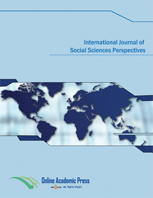Conflict and livelihood changes in the south west region of Cameroon: A social capital perspective
DOI:
https://doi.org/10.33094/ijssp.v12i1.682Keywords:
Cameroon, Conflict, Livelihood, Social capital.Abstract
The relevance of acceptable livelihoods for the socioeconomic wellbeing and human survival cannot be overemphasized especially within a socio-political context. This study attempts to understand the livelihood changes that have taken place between 2015 and 2020 for displaced and resident households within the communities in Manyu from a social capital perspective. Despite being replete with conflicts in the past, the recent uptick of socio-political crisis in Cameroon’s two English speaking regions have led to several deaths, displacement of persons and livelihoods are affected. For a long duration of the crisis (6 years), very little attempt has been made to understand how the crisis is changing the livelihood dynamics of different actors in the affected areas of Manyu Division. As an exploratory study, we employ purposive sampling and simple random sampling to respectively select the two divisions and study communities. Quantitative data was collected using a survey questionnaire and interview guide while for qualitative data, an observation guide, participant observation and key informant interviews were considered. The study reveals that the existing social order of communities is replaced by a new form of chaotic dictatorial and coercive structure without respect for human dignity but self-interest. Also, a common meal can pacify tensions during conflicts by building trust, solidarity and netness for conciliation and social harmony. Greater strides be made between contending faction to resolve the conflict so displaced persons and households could return to normal life.




